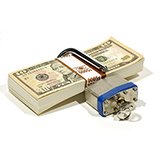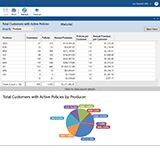Most agencies nowadays are either sold by the agency principal or by an industry specific business broker who specializes in the sale of insurance agencies. However, some agencies are listed for sale by a general (non-specialized) business broker. General business brokers serve a valuable and needed role in the sale of a business and typically do a very good job selling the businesses of Main Street America. However, because insurance agencies have a number of variables that are not common knowledge, this article will examine the difference between using a general business broker and a broker who specializes only in insurance agencies.
Insurance Agency Specialists
So who should you hire? There was a PIA dinner party at Ruth’s Chris Steak House. The waiter saw a logo on the polo shirt of one of the guests. He inquired as to what the company was. The guest responded “I do merger and acquisition work in the insurance industry.” The waiter’s response was “So do I!” Really?
Do you want to hire a general business broker that sells restaurants, flower shops, and bowling alleys and waits tables at night? A business broker does not have the industry expertise that an insurance industry consultant has, and also does not have the quality and quantity of contacts of the industry consultant. A general business broker should be able to qualify a Buyer from a financial standpoint, but will probably not be able to determine whether the Buyer can be successful at running the agency. If you are going to get outside help, go to someone that knows the industry and isn’t going to market your agency through mass mailings.
Ideally you should hire someone that knows your business. The industry specific consultant will know what questions to ask you, what information to gather, and who are good, qualified candidates. However, a good candidate to purchase an insurance agency is completely different from a good candidate to purchase a main street business. Consequently, marketing an insurance agency is very different from marketing a main street business. Many businesses that brokers market don’t need someone who has prior experience; insurance agencies are a whole different ballgame.
The next issue is the cost of hiring a consultant / broker. There are three main forms of broker compensation: hourly, flat fee, and commission. A broker may use any one, or combination of these. An hourly rate is billed regardless as to whether or not the agency is sold. Additionally, you have no way of knowing what the final total cost will be. While a flat fee is providing a fixed price, it is usually due whether or not the agency is sold. Most common is a commission upon the successful sale of the agency.
According to Wikipedia:
“In North America, success business broker fee commissions range from 5% to 12%. Usually, the smaller the transaction, the larger the commission. “Main Street” businesses, those with enterprise value between $100,000 and $1,000,000 can expect commissions to average between 10-12%.”
While this is true for businesses in general, it is inappropriate for insurance agencies that are more intangible in nature. Unfortunately, many general business brokers that represent insurance agencies charge this level of fee for their service.
Insurance industry specific brokers tend to charge lower percentages, in many cases using the Lehman Formula. The Lehman formula is a formula initially used by investment banks for the raising of capital. In the case of agency sales it is:
- 5% of the first $1 million of purchase price
- 4% of the second million
- 3% of the third million
- 2% of the fourth million
- 1% of everything above $4 million
In addition to lower commission rates, an industry consultant knows who is looking to acquire agencies, and will market your agency to the appropriate Buyers to not only help maximize the purchase price but to also make sure there is a corporate culture match.
















